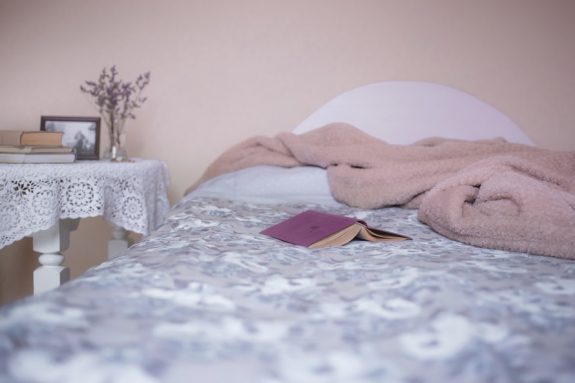Last Saturday, my three-year-old son did not take his usual mid-afternoon nap. Most parents wouldn’t think this a very big deal. Kids skip naps all the time, right? Well, my son doesn’t. Ever since my “Epic Battle To Make Baby Sleep” during year one of his life, I’ve been kind of a nap Nazi. His naps are vital to both his well-being and mine; I will do anything to make sure he gets a good one. And last Saturday, I was reminded of why I do this.
At first, my son seemed fine. His eyes looked a little weary, but otherwise he was his usual sweet, polite self. Then, about an hour after the time he usually wakes from his nap, he changed into a totally different person. Not a monster, exactly; we didn’t experience any major tantrums. But he became incredibly overactive, almost manic. He had trouble with transitions, he wasn’t calming down, and he couldn’t focus on anything. This attitude persisted until bedtime, where he made up for his lost nap by sleeping a little later the next morning.
Now think about what happens when you don’t get enough sleep. Do you become a different person? Are you more irritable? Do you have trouble following your usual routines? Do you lose focus on your work?
Chances are, the answer to all of the above is yes. Sleep deprivation is a very common problem for most American adults. Unfortunately, we don’t recognize it as easily in ourselves as we do in our children.
Why We Need To Talk About Sleep
Many of us are walking around with chronic sleep-deprivation, and we don’t even notice it. We might attribute our irritable behavior to a bad day, our lack of motivation to a project that isn’t going well, or our inability to focus on distractions like Twitter and YouTube. But these problems, while sometimes aided by external factors, can all be solved by one big internal factor: get enough sleep.
Why Sleep Is Especially Important for Creatives/Writers
Sleep is important for everyone, but it’s especially important for people like us. How many of you get up early to write? I count on sleep to “wipe the slate clean” for me every day, so I can start writing the next morning and feel my creative juices refreshed. Even if you don’t write first thing, that good night’s sleep is needed for your brain to store information, mull over characters, and find the endings to your stories. That burst of inspiration you felt today? If you weren’t well-rested, that might not have happened. Or it might be a rarer occurrence than if you were getting good sleep on a regular basis.
Why More Sleep Is Better Than More Work Time
We tend to think of sleep as something that should fit in around work hours, when it’s really the other way around. When you’re truly well-rested, your ability to focus on the task is much greater, and your productivity levels rise. I speak from experience here: I make sleep an even higher health priority than eating vegetables or brushing my teeth, and as a result, I very rarely have problems focusing when I sit down in front of my laptop. I’m able to reach high word counts in productive chunks of time. As long as I’m getting enough sleep, I can feel confident that I’ll achieve my writing goals in any given day or week.
Tips For Getting More and Better Sleep
Know Thyself
Are you a night owl, or a “lark?” Don’t try to make yourself conform to a schedule that doesn’t work for you. If you do work best at night, then by all means, use that time, but make sure you sleep later in the morning or take a nap to make up for it. If you’re getting up early, make sure you get to bed early too.
Set Alarms for Waking AND Sleeping
Most of us set an alarm to help us wake up in the morning, but have you ever thought of setting one to remind you to get ready for bed? Willpower tends to be lower in the evening, so if you’re finding yourself postponing sleep to watch “one more episode,” you may need a reminder to prioritize your bedtime.
Make it Comfortable
Get your electronic devices out of the bedroom at least half an hour before bed; make sure the room is dark and relatively cool; and give yourself as many comfortable linens, pillows and pajamas as you can afford. You should be spending about a third of your life in bed. Invest in your time there!
Take a Nap
Ariana Huffington is now famous for advocating sleep as a restorative in the workplace. If your workplace doesn’t have nap rooms, see if you can find another place to close your eyes for ten minutes. That’s all it takes to rest and restore your mind for a more productive afternoon. If your boss looks more kindly on meditation than on napping, just ask for a brief time to meditate with your eyes closed, and he won’t know the difference unless you start snoring!
Take a Week to Completely Focus on Getting More Sleep
At the end of that week, write down any differences you’ve noticed. Once you start getting the proper amount of sleep your body and brain needs, you’ll never want to go back to sleep deprivation again.
 When not sleeping, Leanne Sowul writes the column “Be Well, Write Well” for DIY MFA. Her historical novel, Waist: A Tale of the Triangle Fire, is currently out on submission. In the meantime, she is working on her next historical novel and a nonfiction project, The Creativity Perspective, that helps readers grow their creativity using everyday life strategies. Leanne also blogs about writing, reading, work/life balance and self-improvement at Words From The Sowul. Connect with her at leannesowul(at)gmail(dot)com, or on Twitter @sowulwords.
When not sleeping, Leanne Sowul writes the column “Be Well, Write Well” for DIY MFA. Her historical novel, Waist: A Tale of the Triangle Fire, is currently out on submission. In the meantime, she is working on her next historical novel and a nonfiction project, The Creativity Perspective, that helps readers grow their creativity using everyday life strategies. Leanne also blogs about writing, reading, work/life balance and self-improvement at Words From The Sowul. Connect with her at leannesowul(at)gmail(dot)com, or on Twitter @sowulwords.







